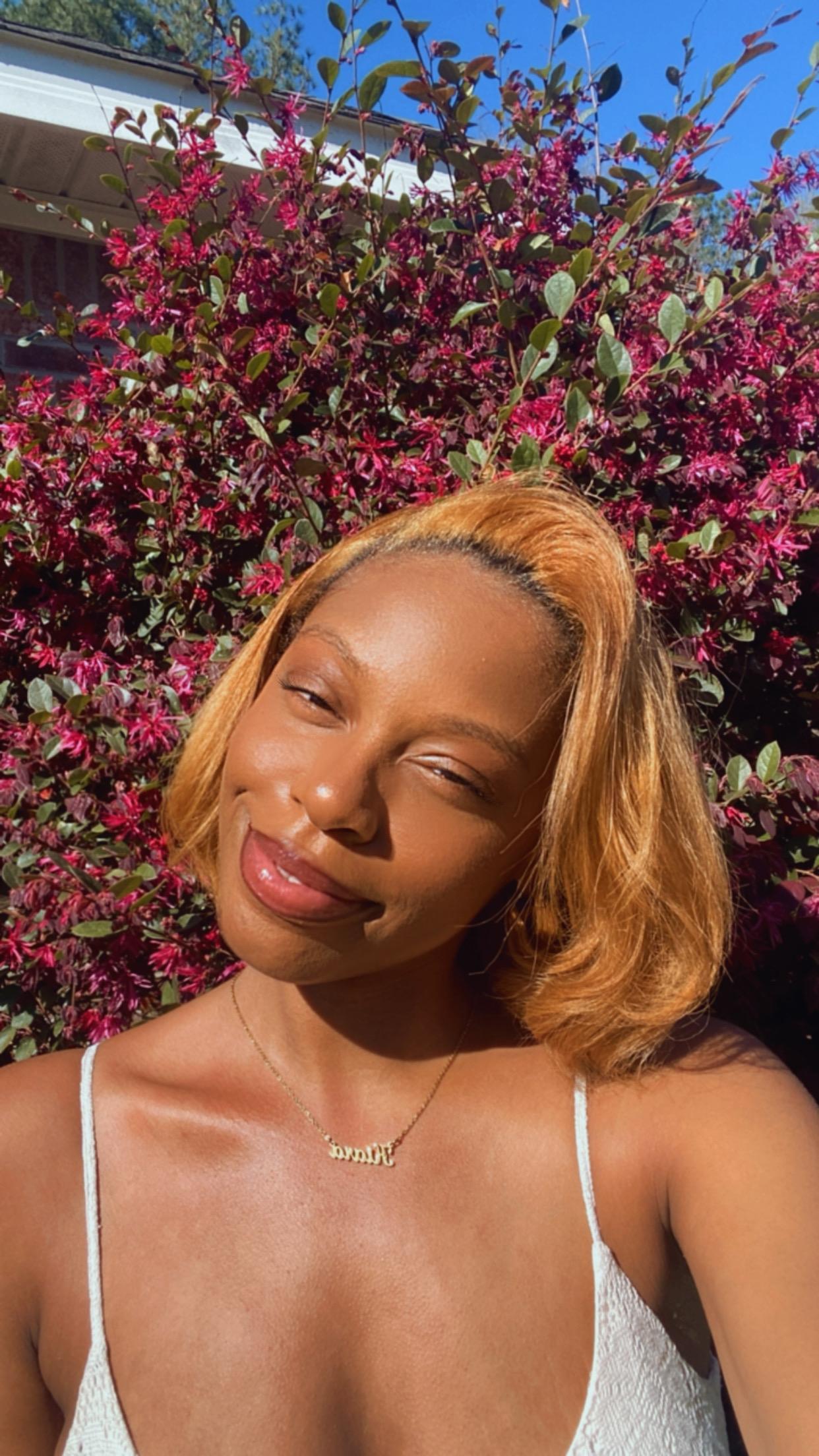Born out of anger, appetite for knowledge, a hunger to educate, and a will to overcome systematic racism, Miller set out to forge her path in the finance industry. A loving disruptor, Financial Equity Strategist, and Founder and CEO of RiteSizeMele Miller created her company in 2018 with the mission to change money culture. With 30 years under her belt, Miller continues to build her company, training the next generation of strategists to educate others. Also, she uses her knowledge to teach those at Seattle Central College. Working her way up the ladder, she set out to change discrimination and injustice in the banking industry. She has refined strategies for some of the world’s largest banks and credit unions in the country, including US Bank and Seattle Credit Union.
Miller has developed an extensive resume, generating up to $386 billion in institutional assets over her career. After completing her education, Miller continued her journey to become a finance powerhouse, serving in the U.S. Embassy in Singapore, and of course, leading the next generation of financial heavyweights through her own business.
The proud mother of three boys is not slowing down anytime soon. She aims to continue to expand her empire, advocating for women and women of color, becoming an inspiration for women in the finance industry and beyond.
Her Agenda: What has been your journey from bank teller to CEO, and what inspired you to make that leap?
Mele Miller: Banking and finance were not on the radar. I didn’t seek it out. It was very much an act of not even desperation. It made sense in the moment. While I consider myself a highly strategic individual, something linking up strongly to my values, what I need, and what my community needs in that moment, those intentions are so powerful. It does change the trajectory of my plans. When I became a teller, it was because I was broke and I didn’t understand the systems of banking and money. I am a hardworking and smart person. Growing up without a lot of resources, the last thing you want to do is blow cash. I felt ashamed of my lack of banking knowledge.
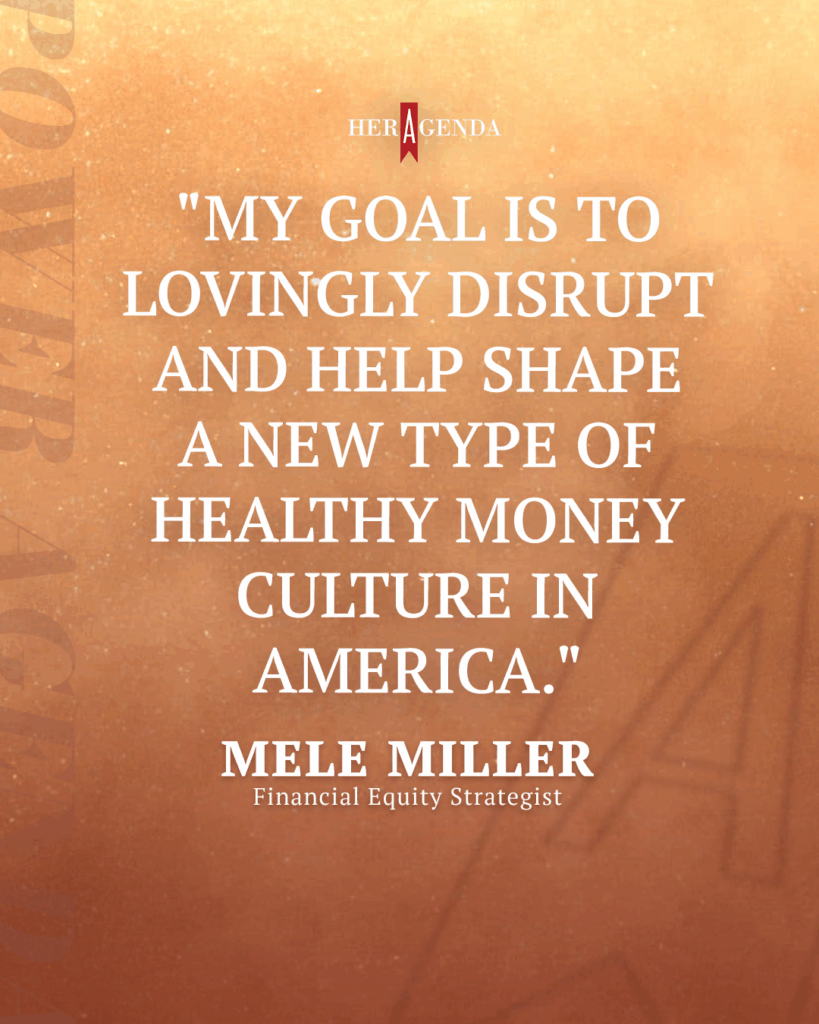
When I was in there trying to get help, the way that the branch manager and the tellers spoke to me was so demeaning. I don’t know that I’ve ever said this out loud, but instead of simply doing their job, they turned it into a very embarrassing and shameful experience. I saw the way my parents were talked to in banks, the way my community was treated, and I didn’t want that. Becoming a teller was just a small opportunity to earn money and to help fill the gap, but also to learn about some things that I didn’t feel confident about.
What I’ve learned about myself over the years and in my career is that when knowledge is the gap, I don’t allow myself to become scared. I move forward, try to learn and grow. That is what drove the entire arc from teller to CEO, because I realized in every role that I was in, there was more to learn. It was never enough because in the landscape of my community, I wasn’t seeing the change that I wanted to see.
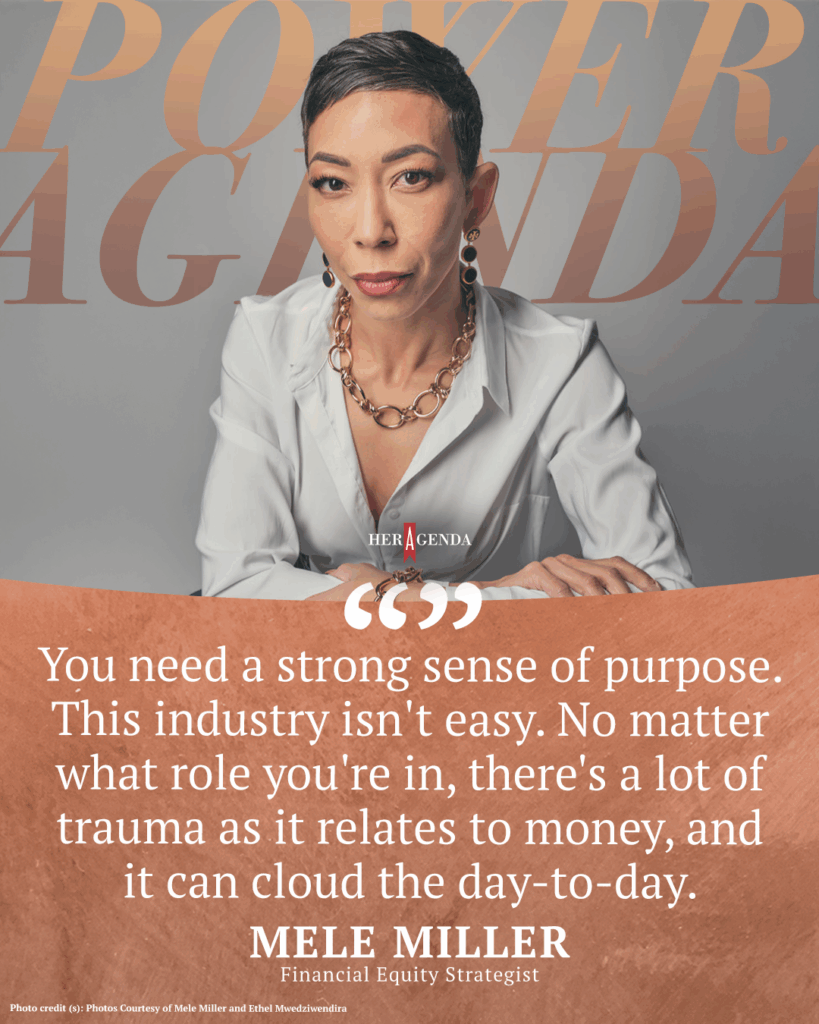
Her Agenda: What is a pivotal moment in your career that stands out to you to this day?
Mele Miller: I would say the day that I asked, the first time and probably the only time in my entire life, I asked to speak to a manager. It was the day when I insisted on becoming a teller and entering the industry. I had overdrawn my account, and I didn’t even know how. It was my first checking account in my entire life. I was a college student enrolled in a dual-degree engineering program. When I went in there for help, it never occurred to me that they wouldn’t want to just answer a knowledge-based question. I went into the branch, and I was dismissed. People were avoiding eye contact, stepping around me, over me, and I have to admit, I started to tear up.
Then a blonde-haired, blue-eyed basketball player walks in. When I tell you, I thought the entire branch lit up like a party when he came in the door. They were so excited to see him. We see you have an overdraft charge. Don’t worry about it. We’ll just take care of this one for you. That is when the tears sucked back up into my face, and I got so angry. That was the moment of lift.
From then on, I vowed no one would open an account without understanding it. The moment the tears dried and the shame turned to anger still sticks with me.
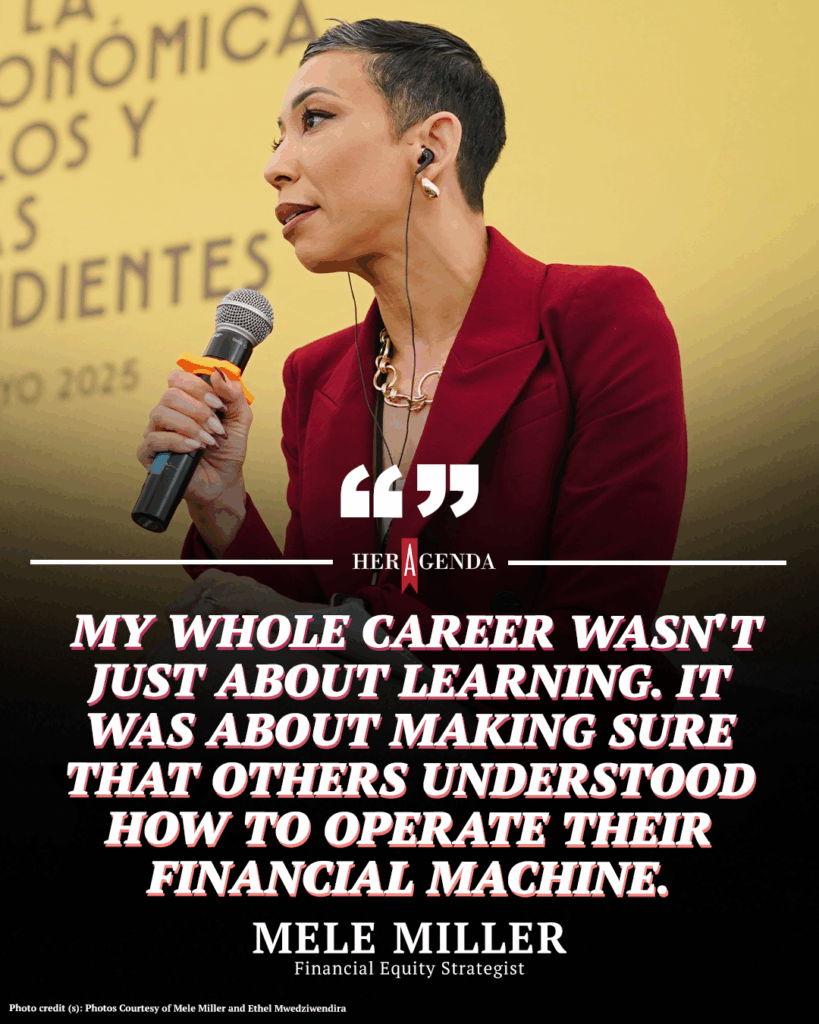
Her Agenda: What would you say has been the most challenging part of your career?
Mele Miller: There were two pivotal moments, and they’re connected to the challenging part. That first pivotal moment was deciding that I couldn’t trust somebody else to educate me if they had no interest and desire. That second pivotal moment that was also difficult to swallow was when I finally made it to the C-suite after 25 years. You realize that people sitting at the table aren’t impressive. They haven’t experienced a teller position or just aren’t motivated to do the right thing. The moment I got to the C-suite, I was underwhelmed. That was the second very difficult moment. My whole career wasn’t just about learning. It was about making sure that others understood how to operate their financial machine.
I’m a woman. I’m a racially ambiguous Black woman, and people have questions. I overcame that with consistency, but it’s not just about consistency. It’s about authenticity, telling the truth, even when that truth doesn’t get you the deal, but does the opposite, because it’s the right thing. So it’s not just what you say, it’s how you say it, how often you say it. I had to do it to survive, to respect and love what I do. As a result, I realized it was time to do something completely different. That’s why I launched my company.
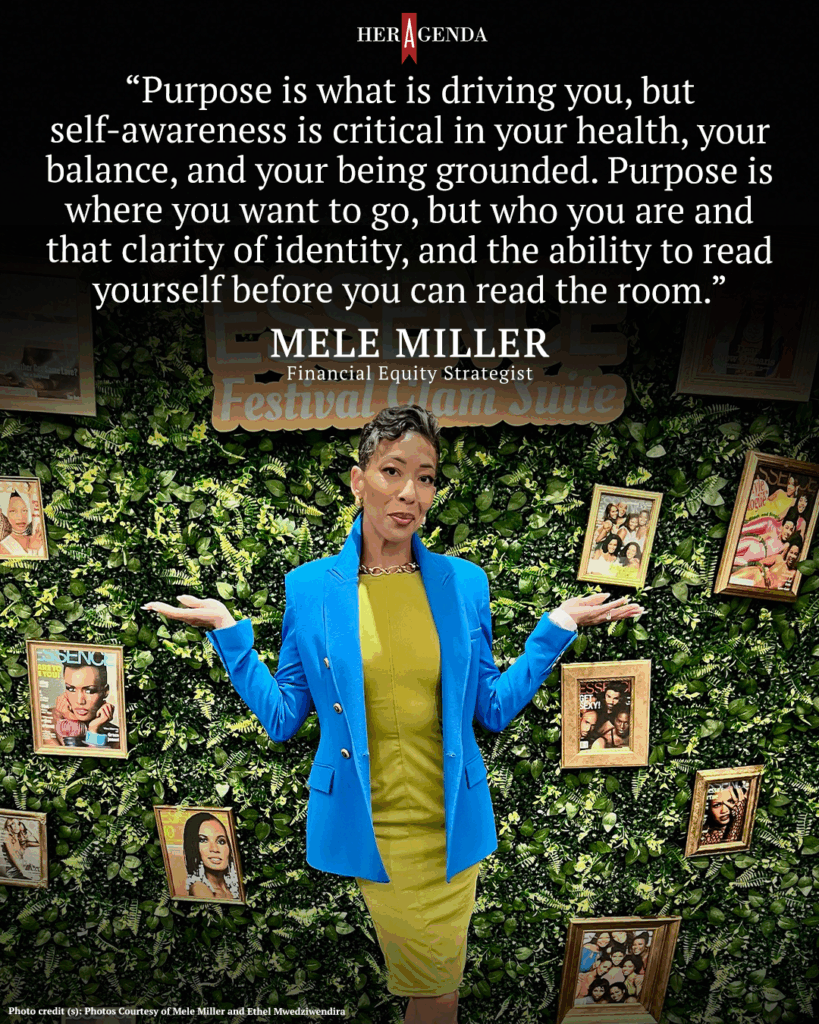
Her Agenda: What skills and abilities would someone wanting to enter the financial business need?
Mele Miller: You need a strong sense of purpose. This industry isn’t easy. No matter what role you’re in, there’s a lot of trauma as it relates to money, and it can cloud the day-to-day. You must understand why you’re doing what you’re doing. That sense of clear and resounding purpose is going to help you understand and answer the most complicated questions in life.
Second, would be self-awareness. Purpose is what is driving you, but self-awareness is critical in your health, your balance, and your being grounded. Purpose is where you want to go, but who you are and that clarity of identity, and the ability to read yourself before you can read the room. You need to know who you are and why you are.
Integrity. People save all their lives to be able to retire. This is life savings. These are the tools that they use to feed their families, to live, and to survive. You must treat it with the highest level of respect and integrity.
Lastly, communication. Communicating ethically is mission-critical. That global mindset means nothing if you don’t know how to communicate with people who have a different perspective on the world. Communication is about exchanging thoughts and ideas.
Her Agenda: There is a lot of competition in this field. How do you typically stay ahead of the curve?
Mele Miller: As a smart business person, I would say you’re right. Everyone has competition. You’ve always got competitors, even though they may not do the same thing that you do. But being raised in Hawaii, I’ll tell you, I don’t believe in competition. I believe in collective abundance and community. The anchor of what drives me is not competition at all. It’s how do I add value to the people I’m looking to partner with and work with, and support?
I teach. Being a teacher, a trainer, and a developer requires that your pencil stays sharp. It also requires humility. Questions will get thrown at you, and the ability to know when you don’t know and constantly learn. Being a teacher is being a learner.
I believe strongly in collaboration. We all have blind spots and gaps. We are strongest when we are partnering with others who do a lot of things better than you. That’s a great way to learn, especially when you’re on a team. There is so much synergy and strength and joy that comes from that. I collaborate often with entrepreneurs because they are extremely gritty and creative, and fearless.
Staying on the cutting edge, especially in this industry, is to be a dreamer. If you build a strategy around them, those dreams become visions that help you shape strategies and outcomes that others may have thought of but weren’t willing to share out loud. Those dreams have brought me this far. I never stopped dreaming.
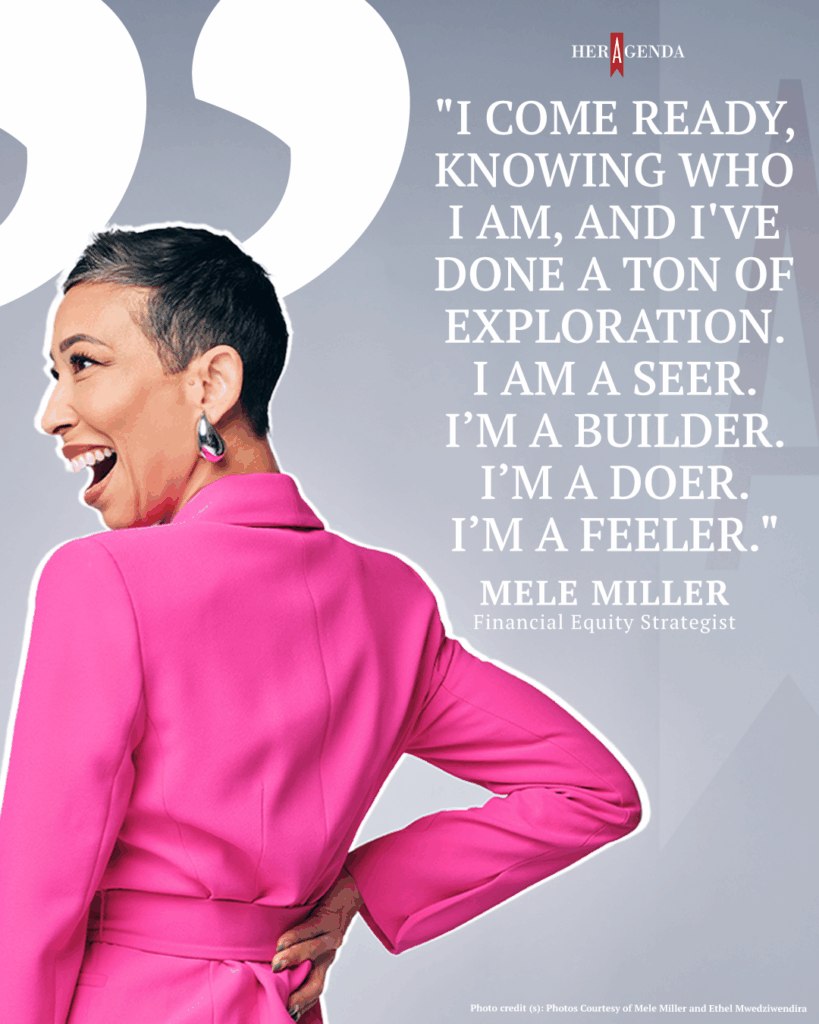
Her Agenda: You’ve had a long career, and I’m sure it can get quite hectic at times. How are you able to achieve that work-life balance that works for you?
Mele Miller: I’ll start by saying I don’t believe in work-life balance. That creates a sense of pressure for me because when I think of balance, I think like 50-50 towards each. Well, my values, what I believe in, my community, my career, my family, they’re all integrated. The sense of balance, I don’t aspire to. Primarily because I’ve tried and failed. It’s not a thing. Integration is a thing. If you recognize that there is no such thing as compartmentalizing your identity, your values, and your priorities, that’s huge. That recognition frees you up to integrate a little bit more seamlessly.
You can see the imbalance glaringly. It’s not rocket science to say, well, that would explain why I feel this way, or why this is happening in my business, or why it’ll help you, it’ll help reveal your blind spots. If I’m not well physically, mentally, I don’t do good work. I’m late. I’m not sharp. I’m not happy. I’m not whole. A whole leader drives well, moves forward, and achieves their objectives. So I think it’s just about understanding that balance is a very different framework than integration.
Her Agenda: What would you say is a piece of advice you would give somebody hoping to enter the finance industry?
Mele Miller: Know exactly who you are. Also, introduce yourself early and often so that people forget their assumptions and only recognize your truth. You tell the world who you are, state it, and restate it with your actions, your behaviors, and the way you introduce yourself. Good morning, my name is Mele Miller. I’m a financial equity strategist. Know who you are. If you don’t lead with that, people will impose their desires, their expectations, their assumed identity on you. If you’re not willing to tell folks who you are, you become who they want you to be. Come with your identity held strong and a willingness and eagerness to introduce yourself and let it be known. That’s smart. Very confident. Well, if there’s one thing you can be confident about, it’s you, right? You don’t have to be the best in the room, but knowing who you are helps a lot.
Her Agenda: I have to ask, so what’s next for you? What is something that you are hoping to add to your list of achievements?
Mele Miller: While I am goal-oriented, I’m also a loving disruptor. I understand the beauty and the pain associated with change. A lot of my gifts and talents lie in being a loving disruptor and ushering in, guiding, and building the type of change that makes room for collective prosperity. When I think about what’s next, my goal is to lovingly disrupt and help shape a new type of healthy money culture in America. I’m not driven by money. So, reframing our circumstances of prosperity in the country is my current goal.
When I think about what’s next, global takeover, global transformation, understanding and delivering, and partnering with others to drive this sense of value creation in ourselves versus money as a tool. More tangible things might be this podcast, which in my mind is a talk show. Getting national and global recognition tells me it’s not that it’s popular, it’s driving culture. The articles that I write, the information, the reframing of mindset, it’s more than getting my research published. It’s more than what I’ve done. It’s more than having your articles and your thought leadership being featured in a publication. It’s about driving a culture.
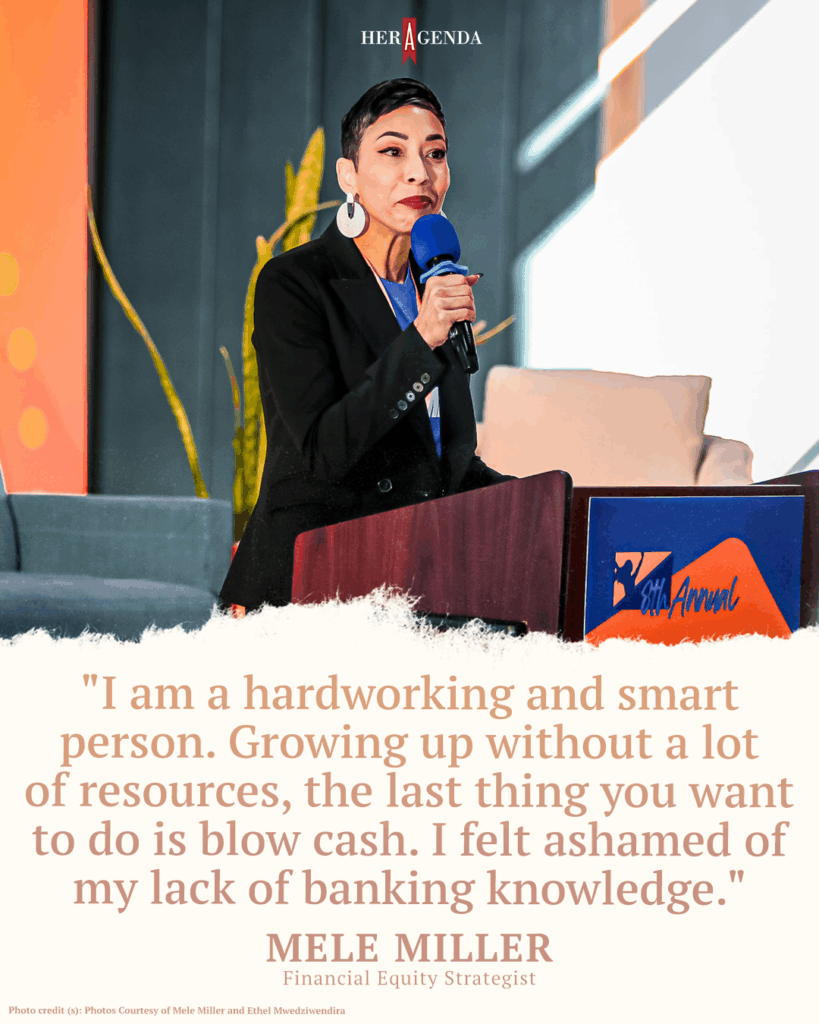
Her Agenda: In five words or less, who is Mele Miller?
Mele Miller: That’s easy. I come ready, knowing who I am, and I’ve done a ton of exploration. I am a seer. I’m a builder. I’m a doer. I’m a feeler. I will never stop being those things.
[Editor’s note: This interview has been edited for length and clarity.]



